Martin Luther King III
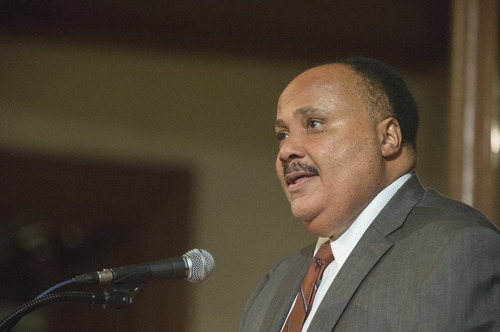 "It's important that we make sure that the lessons of leadership JFK and my father exemplified are not lost," Martin Luther King III told an audience that packed Meharry Hall at DePauw University tonight. Speaking on the eve of the 50th anniversary of the assassination of President John F. Kennedy in Dallas, the eldest son of Martin Luther King Jr. said it's imperative "that we see to it that each new generation picks up the fallen mantle and carries it forward into the future."
"It's important that we make sure that the lessons of leadership JFK and my father exemplified are not lost," Martin Luther King III told an audience that packed Meharry Hall at DePauw University tonight. Speaking on the eve of the 50th anniversary of the assassination of President John F. Kennedy in Dallas, the eldest son of Martin Luther King Jr. said it's imperative "that we see to it that each new generation picks up the fallen mantle and carries it forward into the future."
King presented a Timothy and Sharon Ubben Lecture, "Reflections on the 50th Anniversary of Two Pivotal Events: My Father’s ‘Dream’ and JFK in Dallas." He spoke in DePauw's East College, about 100 yards from Gobin Memorial United Methodist Church, where his father, the legendary civil rights leader, addressed an audience in 1960.
Tomorrow is a "momentous anniversary loaded with significance and meaning," King said tonight. Just six years old at the time, King says he could sense even then that the president's death "caused a profound transformation of our country ... In one day, we had gone from the optimistic spirit that was called Camelot with all of the hope that was embodied in President Kennedy's New Frontier initiatives to widespread despair and pessimism about the future."
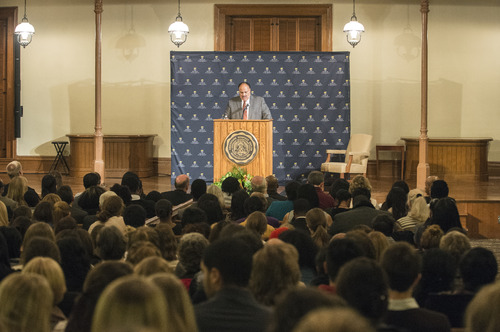 King called President Kennedy "a man of extraordinary grace and vision with a wonderful wit. His assassination was a soul-shattering experience for millions of Americans ... Uniting his flair for leadership with a program of social progress, he was, at his death, undergoing a transformation from a hesitant leader with unsure goals to a strong figure with deeply appealing objectives."
King called President Kennedy "a man of extraordinary grace and vision with a wonderful wit. His assassination was a soul-shattering experience for millions of Americans ... Uniting his flair for leadership with a program of social progress, he was, at his death, undergoing a transformation from a hesitant leader with unsure goals to a strong figure with deeply appealing objectives."
A human rights advocate, community activist and a political leader, Martin Luther King III recalled the somber mood in his family's home on that night a half-century ago and of the relationship his father and the president shared. "The Kennedy administration and the civil rights movement, however, did lock horns on occasion, which was to be expected. The job of the movement was to push the administration to a higher level of leadership, and I think the movement was successful in meeting that challenge. But it should also be said that President Kennedy rose to the challenge -- certainly of civil rights -- and by the time he was assassinated President Kennedy was regarded by millions of African Americans as a friend to our freedom struggle and a leader who sincerely cared about securing racial justice and equality as a priority for America." (at right: cover of November 25, 2013 issue of TIME magazine)
He continued, "John F. Kennedy did not live to complete even one term as president, but he helped to prepare America for an era of unprecedented progress toward racial equality and he inspired millions of young Americans to serve their country." King called upon students to embrace President Kennedy's "living legacy and his immortal example by engaging in public service."
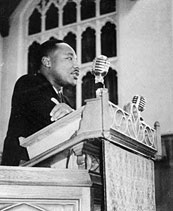 Three months before the young president's killing, King's father delivered one of the world's most famous speeches at the March on Washington. Speaking to a crowd of more than 250,000 civil rights supporters on August 28, 1963, Dr. King declared "I have a dream" in an address that scholars declared the best American speech of the 20th century. (at left: Martin Luther King Jr. speaks at Gobin Church on the DePauw campus; September 5, 1960)
Three months before the young president's killing, King's father delivered one of the world's most famous speeches at the March on Washington. Speaking to a crowd of more than 250,000 civil rights supporters on August 28, 1963, Dr. King declared "I have a dream" in an address that scholars declared the best American speech of the 20th century. (at left: Martin Luther King Jr. speaks at Gobin Church on the DePauw campus; September 5, 1960)
This summer, Martin Luther King III joined President Obama and other leaders to mark the 50th anniversary of that historic occasion.
At DePauw tonight, Dr. King's son recalled his the March on Washington as "one of the most uplifting milestones of American history -- the day when our nation embraced a vibrant vision of interracial unity, social justice and harmony that still inspires people all over the world." At this year's commemoration of the 50th anniversary of the event, "We celebrated a dream that everyone could share -- the dream of Americans of all races and religions and cultures reaching out to one another and working together to build new bridges of understanding and cooperation."
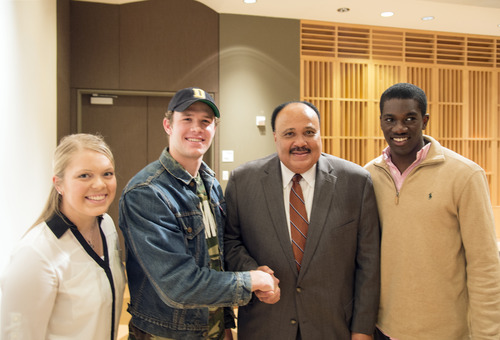 He added, "The vision of unity my father shared with the nation that he loved on that day fifty years ago remains a widely-taught value in schools across America. But the part of the speech where he talks about the urgency of connecting racial and social injustices through disciplined non-violence is too often glossed over when the speech is discussed. That's a problem, because you can't fulfill the dream without an active commitment to address poverty, racism and violence with organized non-violent resistance."
He added, "The vision of unity my father shared with the nation that he loved on that day fifty years ago remains a widely-taught value in schools across America. But the part of the speech where he talks about the urgency of connecting racial and social injustices through disciplined non-violence is too often glossed over when the speech is discussed. That's a problem, because you can't fulfill the dream without an active commitment to address poverty, racism and violence with organized non-violent resistance."
The younger King is deeply troubled by voter ID laws that he believes are limiting access to the polls across the nation and choking democracy. He also believes that a spirit of cooperation must return to Washington for the work of the people to get done by Congress.
"In spite of all the divisions and animosity that plague our society we still hold out the hope that reconciliation and brotherhood and sisterhood are still possible," King said.
The Civil Rights Act was stalled in Congress at the time of President Kennedy's assassination three months later, but the legislation was passed the following year and was signed into law by President Lyndon Johnson.
In 1968, assassins would claim the lives of Dr. King and Robert F. Kennedy.
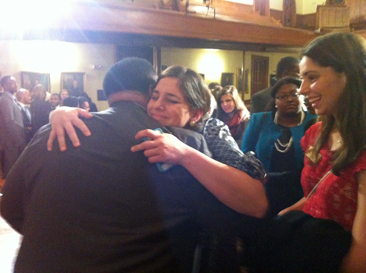 As America prepares to remember the tragedy of November 22, 1963, King noted, "The epitaph of John Kennedy reveals that he was a leader unafraid of change. He came to the presidency at one of the most turbulent and cataclysmic periods of human history, a time when the problems of the world were gigantic and intense and chaotic in detail." With tensions between the U.S. and Russia at peak levels and the push for civil rights growing, Kennedy "had the courage to be a friend of the civil rights and a stalwart advocate of peace. The unmistakable cause of the sincere grief expressed by so many millions was more than a simple emotion; it revealed that President Kennedy had become a symbol of people's yearning for justice, economic well being and peace."
As America prepares to remember the tragedy of November 22, 1963, King noted, "The epitaph of John Kennedy reveals that he was a leader unafraid of change. He came to the presidency at one of the most turbulent and cataclysmic periods of human history, a time when the problems of the world were gigantic and intense and chaotic in detail." With tensions between the U.S. and Russia at peak levels and the push for civil rights growing, Kennedy "had the courage to be a friend of the civil rights and a stalwart advocate of peace. The unmistakable cause of the sincere grief expressed by so many millions was more than a simple emotion; it revealed that President Kennedy had become a symbol of people's yearning for justice, economic well being and peace."
In closing, King -- who received three standing ovations and stayed to talk with audience members after the program -- called on DePauw students "to understand our interconnectedness" and work to make the world they will inherit a better place.
King helped negotiate a compromise between Georgia legislators and leaders to change the state flag that was an offensive and divisive symbol for many Georgians. In the late 1970s he was asked to represent President Jimmy Carter in two official delegations to promote peace in foreign countries. In 1984, as a member of the board of directors of the Martin Luther King Jr. Center for Nonviolent Social Change, Mr. King ventured to five poverty and drought-stricken African nations on a fact-finding tour. The outcome of the tour was the creation of the Africa Initiative, a program developed to end starvation in Africa.
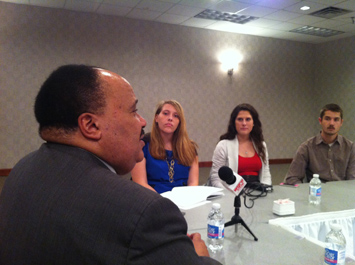 The former president of the Southern Christian Leadership Conference, King founded the nonprofit organization Realizing the Dream, Inc., which eventually merged with The King Center in 2010. (at left: King with DePauw student journalists)
The former president of the Southern Christian Leadership Conference, King founded the nonprofit organization Realizing the Dream, Inc., which eventually merged with The King Center in 2010. (at left: King with DePauw student journalists)
King's day at DePauw began with a student forum at which he took questions from undergraduates for nearly an hour and then posed for pictures. Next up was a session with student journalists, followed by dinner at the home of President Brian Casey, The Elms, which was attended by students, members of the faculty and staff, and alumni. King spoke for about a half-hour before engaging in a lengthy question-and-answer session with the audience in Meharry Hall.